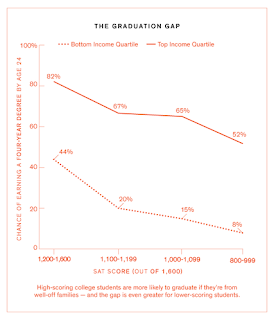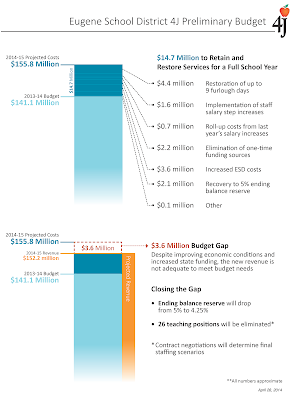Note: If anyone has a better understanding of these financial documents, please feel free to correct me!
A Preliminary Budget Gap
In April the 4J school district Superintendent and board released their
preliminary budget.
Unsurprisingly, it has a projected budget gap.
The district spends an average of
$152,200,000 annual budget ÷ 15,843 students = $9,607 per student
The national average is about
$12,740 per student. Our school district is spending only 75% of the national average. No wonder it has a budget gap!
Pension Problems?
Of course, the word
pension does not ever occur in the preliminary budget
main document. Is the school district in a pension crisis? Maybe
that is why our schools seem low on money.
I can go to the district's
archive of financial documents to find the
2013 Comprehensive Annual Financial Report. It provides details for the school year that ended in 2013.
The postemploymet benefits fund had income of $2 million
(page 145). This is the money taken from other funds because part of planning salaries is set aside money for retirement costs. $1.7 million came from the general fund support services category. $0.3 million came from the support services category of the various other district funds.
The postemploymet benefits fund had expenses of $5.7 million
(pages 146-147). So it is costing the district an
extra $3.7 million.
This $3.7 million expense does not seem to be actual payments. If I am understanding the financial report, all pension payments are been made through $50 million of pension bonds (page 174) which that year cost the district $3.7 million of principal and interest (page 71).
Is it just
me, or does only allocating $2 million for retirement out of the $137
million for instruction and support seem awfully low? I would expect
public sector salary planning would allocate more than 1.2% to
retirement expenses. Perhaps the previous superintendents thought such a
low percentage was sufficient, which is why now bond money must be
used?
$3.7 million of extra pension expense sounds like a lot of money. After all, it would close the projected budget gap.
But it is only 2.4% of the preliminary 2014 budget. It works out to $234 per student.
That does not seem to be an enormous strain on the school district's finances. Sure, 2.4% hurts. But it should not be crippling.
UPDATE: My numbers are way too low. More recent information is here.
Support Services
That year the district's general fund income was $68
million from local sources, $64 million from state sources, and $0.9
million from Federal sources.
(Those categories are broken down on page 117.)
Instruction cost the general fund $82 million. Support services cost $55 million.
(Those categories are broken down on page 118. Teacher salary information is here.)
The teachers hopefully get nice
benefits. For both instructional and support employees their benefits
are 34% of their total cost. The national average is 30%.
So support services costs $3,394 per student, of which only $234 is the previously analyzed retirement costs.
Why is 33% of the district's cost per student on (non-retirement) support services?
That is an enormous amount spent on administration, health, guidance, and busing!









